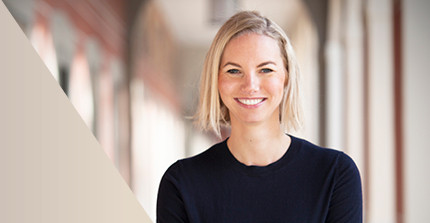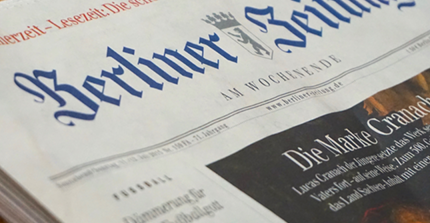Kira Brück
What did you study? What is your educational background?
First, I completed my high school diploma in Wiesbaden, then studied German language and literature, communication science, and philosophy at the University of Bamberg. After that, I spent two years at the Burda School of Journalism for an internship.
What was your personal motivation for choosing your field of study and career?
I wanted to be a journalist since fifth grade. There are many health resorts in Wiesbaden, where I grew up. I went out and interviewed the guests: how they liked it here, what they missed (they would have liked a nice café). I'm very interested in what people think, how they live their lives, how they deal with strokes of fate. That curiosity still drives me today. Sometimes I'd love to chat up someone on the train and ask, “What's the story of your life?”
To get an internship (Volontariat), you needed (at that time) a university degree. So I studied what I enjoyed most: something in the humanities. I loved my studies and usually had enough time to write and edit for the student newspaper.
How did you get into your current job?
After completing my internship and working in various positions at large publishing houses, I wanted to write more and live my everyday life in a more self-determined way. That's why I decided to work as a freelance journalist in 2013. I haven't regretted this decision for a single day.
The network is more important than anything else later on. On the other hand, you can also gain a foothold in the industry without Volo (Volontariat), so it's not a must, but it's definitely helpful.
Did your studies prepare you well for your professional career? What do you think is the most important thing you learned there for your profession?
In communication studies, I had many practical seminars in which we went out and created stories. But of course, studying cannot replace time spent in a real editorial office. In that respect, the student newspaper was far more formative. We had this green field where we could try things out. Not only in terms of writing and researching, but also setting topics, putting together a newspaper, and leading a team. Much of what I can do today I learned at the student newspaper. For example, that's where I realized that I was a born copy editor.
Among other things, you entered the profession through training at a journalism school—a path that, due to the limited number of places available, is not open to everyone who is interested. In your opinion, how difficult is it to secure a place and is training at a journalism school is absolutely necessary to get a foothold in journalism?
Right now, I get the feeling that journalism schools and publishers are looking for good trainees. This is probably because the profession has become less attractive lately. In that respect, I would definitely give it a try—the chances of getting a place are good at the moment. Personally, I think a traineeship is a good thing because you learn the trade from the ground up and get to know a lot of people. Your network is more important than anything else later on. On the other hand, you can also gain a foothold in the industry without an internship, so it's not a must, but it's definitely helpful.
Your website indicates that you worked for various tabloid and lifestyle magazines, particularly at the beginning of your career. Did you consciously choose this field at the time, or was it more of a coincidence? Is it easy to switch fields during your career, for example, from tabloid to political journalism, or do you commit to a specific topic area based on your initial experiences?
Well, I have nothing to do with tabloid journalism. I did my second internship at Bunte, but since then I've never had anything to do with celebrity journalism again. I write about society, health, and economics. In my experience, you don't have to commit yourself completely from the outset. For example, I wrote a lot about digital education for a while, and became a real expert in the field. Today, that's no longer an issue for me. It certainly makes sense to write about nuclear physics if you've studied it as a subject. But as a German studies graduate, I tend to have a more generalist approach to topics.
What are the last three things you did at work?
Arranged an interview with an expert, completed my accounting for the past month, and edited articles for the business magazine STRIVE.
You are a freelance journalist and also work as an author and seminar leader. How do you organize your everyday working life?
I always have a rough plan for the next three months. That means which texts I have to submit and when, and on which days I prepare my seminars. Then there are also briefing calls, conferences, and interview appointments. I always need to leave a little buffer time in between so that I can go to the gym or in case one of my children gets sick (or I do). So, day by day, I work through what's in my calendar. Fortunately, this usually works out well and I only have to fire up my computer in the evening every now and then.
Is it possible to make a living as a freelance journalist, or do you need a second source of income?
It's definitely possible—I'm the best example of that. However, you do need to think a little like an entrepreneur and consider carefully what your work is worth. Then you need to look specifically at how to find clients who can pay well. Suffice to say, daily newspapers are not among them.
We keep hearing about the first AI-generated texts. How do you think the spread of AI will affect the future of journalism?
Texts written by real people will become more valuable in the future—and will also be labeled as such. No one wants to read a personal text written by AI. There are certainly areas where the use of AI makes sense, even in journalism. But when it comes to classification or personal experiences, thinking humans are needed. And that's how it will stay.
What advice would you give to students from other disciplines, such as social sciences, natural sciences, or economics, or to non-native German speakers who want to enter the German journalism industry?
You have to have a very good command of the German language if you want to write for German media. Otherwise, the editors simply have too much to do—and many media companies don't have the capacity for that. But of course, you can live very well in Germany, write in your own native language, and sell these texts to foreign editorial offices. My office colleague Andrew Curry comes from California and writes only in English. When it comes to subjects such as science or law, these people are actually highly sought after in journalism; they have the best prerequisites for being extremely successful as specialist journalists.
You also work as a ghostwriter—a job that often remains hidden. How did you manage to find clients? What advice would you give to students who want to get into ghostwriting?
Publishers approach me to ask if I would like to write a book for a celebrity. To be honest, after my first non-fiction book, “Der Tod kann mich mal!” (Death can kiss my ass!), I just slipped into it and apparently did such a good job that I kept getting follow-up assignments. Unfortunately, I don't have a real master plan for how to get ghostwriting projects.
Could one make a living solely from ghostwriting?
If you really feel like writing three books a year (which is possible in terms of time), then you could even make a good living from it. Of course, this also requires well-paid assignments.
Over time, you develop your own technique for adapting well to the tone of an editorial office without ”betraying" your own style.
As a journalist, your writing style is like a personal fingerprint—how difficult is it for you to empathize with other clients and strike the right tone?
Because I am skilled at my craft, I find it quite easy. Today I write for Zeit Online, tomorrow for Eltern, and the day after tomorrow for Apotheken Umschau. It's a different sound every time—and yet people who have known me for a long time recognize that it's my writing. Over time, you develop a technique that allows you to adapt well to the tone of an editorial office without “denying” your own style.
What challenges you in your work?
Many freelancers know the awful feeling of being ghosted by an editorial team. It happens to me from time to time, and I hate having to follow up. Otherwise, it's always a challenge to write for an editorial team you've never written for before. It always feels like a new beginning, and you have to keep the little imposter on your shoulder at bay.
Your tips for young professionals?
During my studies, people constantly tried to talk me out of becoming a journalist. They said it was a sinking ship, that the best times were over. But I wanted to write journalism, and that was that. So my advice is: be stubborn and just do it. Internships are the best way to find out for yourself whether this is really what you want. For me, it really is the best job in the world, and it's a huge privilege to be able to make a living from writing.
Thank you very much for your insights into your work as a freelance journalist and author, Kira Brück!
The written interview was conducted in July 2025.


